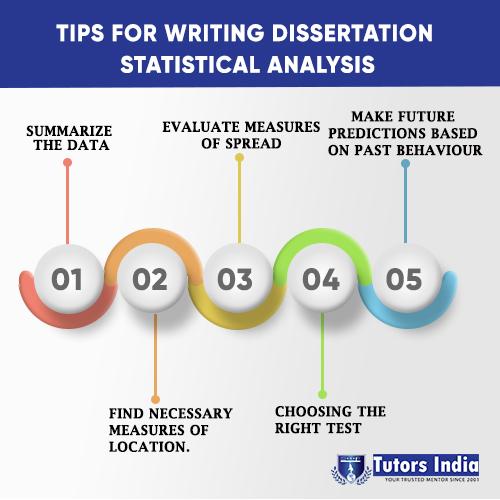Free tips for writing a dissertation statistical analysis
In brief
- Identifying the appropriate statistical method, understanding the statistical software working system, and carry out the analysis without any error, are the major problems faced by the researcher
- It is used in day to day life in various industries, and if your research work or dissertation needs it, it is significant to get it right, as this is something that you might regularly use in your future career.

Introduction
Statistical analysis is mainly about gathering scientific data and uncovering their patterns and trends. It is another way of “statistics.” After gathering data, you can analyze it to:
- Summaries the data. For example, make a graphical representation like the pie chart.
- Find important measures of location. For example, the mean, which states the average (or “middling”) number, is in a data set.
- Evaluate measures of spread:
These help you identify the type of data, whether tightly clustered or more spread out.
The standard deviation is an extensively used spread measure; it shows you how your data is spread out.
- Make future predictions based on past behaviour. It is exclusively used in retail, manufacturing industries, banking, sports, or any institution where knowing future trends would profit.
Hire:Dissertation Statistical Analysis Service
The Challenges of Statistical Analysis
It is the science of collecting and analyzing information and presenting it to reveal the fundamental patterns and trends. It is used in day to day life in various industries, and if your research work or dissertation needs it, it is significant to get it right, as this is something that you might regularly use in your future career. It can be stated in dissertations in various ways, and it often needs different methods. It also helps a variety of subject areas if you require it for your dissertation work; it is an essential component and makes up a huge chunk of your final grade.
It is the most difficult part of writing found in dissertation writing. Identifying the appropriate statistical approach or method, understanding the statistical software working system, carry out the analysis without any error, and then effectively analyzing the outcome are the major problems faced by the researcher
Carrying out the analysis without any mistakes and then accurately analyzing the outcomes are the major tasks that can cause students problems. Statistical consultants strive to present you with accurate results through data analysis tools and services.
But don’t get too stressed over your statistics, statistics help for dissertation uk writers are ready to give a helping hand.
How to frame a Statistical data analysis
Statistics is a science that comprises data gathering, data clarification, and finally, data validation.
It is a procedure that performs a variety of statistical operations. It is similar to quantitative research, which seeks to quantify the information, and applies some form of statistical analysis.
Quantitative data includes descriptive data, such as survey data and observational data.
Statistical data analysis usually contains statistical tools, which cannot be performed by a layman without any statistical knowledge.
There are varieties of software packages found to carry out statistical data analysis, which includes SAS,
SPSS- Statistical Package for the Social Sciences, Stat soft, etc.
Dissertation Statistics Help Using SPSS is used in various complex statistical data analysis.
Statistical data analysis consists of various data in the form of the variable(s), and data may be univariate or multivariate. Based on the number of variables, the researcher performs different statistical techniques.
If the data inside the statistical analysis are multiple, then multivariates can be done.
These are the major factor of statistical data analysis, discriminant statistical data analysis, etc.
If the data inside the statistical analysis is singular in number, then univariate statistical can be done. It comprises t test for significance, z test, f test, ANOVA one way, etc…
The data under statistical data analysisis generally classified into two different types,
Continuous data – The continuous data is the one that could not be counted.
For example, the intensity of light can be measured but cannot be counted.
Discrete data – Discrete data is the one that can be estimated.
For example, the number of electric bulbs can be counted

Statistical tests
Complex statistical analysis has a wide range of statistical tests which can be applied to the collected data. To choose the correct test, you need to refer to two questions:
- Which kind of data did you gather?
- What are the variables you consider to create a relationship between different data?
Selecting the right test is the tricky process, as you must select between two different families of tests: parametric and non-parametric:
- Parametric tests – which comprises Mean, Standard Deviation, t test, analysis of variance (ANOVA), Pearson correlation, regression (linear and non-linear);
- Non-parametric tests comprise the following median, interquartile range, Spearman correlation, Wilcoxon test, Mann-Whitney test, Kruskal-Wallis test, Friedman test.
Choosing the right test
Choosing the right family of tests can be difficult. The following information provides you with basic rules for deciding which help you identify the family of tests that perfectly suits your data. Dissertation statistical analysis services help in choosing in between these different test.
- You must select the parametric test if your data is sampled from a population that follows a normal distribution (or Gaussian distribution). The normal distribution pattern for the distributed set of data follows the bell-shaped curve, which means that the data contain fewer tendencies to produce remarkably extreme values related to some other distribution.
- You must select the non-parametric test if the population does not follow a normal distribution. Where values may be too high or too low to measure, a non-parametric test can assign values too low or too high to measure.
Conclusion
Statistical analysis is the most challenging part of writing found in dissertation writing. It is the science of collecting and analyzing information and presenting it, to reveal the fundamental patterns and trends. It is used in day to day life in various industries, and if your research work or dissertation needs it, it is significant to get it in a correct form, as it is something that you might regularly use in your future career. It can be stated in dissertations in various ways, and it often needs different methods. It is an essential component and makes up a huge part of your final grade. Order now dissertations statistical analysis helps uk
References
- Swetnam, D. (1997). Writing your dissertation: how to plan, prepare and present your work successfully. Oxford: How to Books.
- Lunenburg, F. C., & Irby, B. J. (2008). Writing a successful thesis or dissertation: Tips and strategies for students in the social and behavioral sciences. Corwin press.

 Previous Post
Previous Post Next Post
Next Post